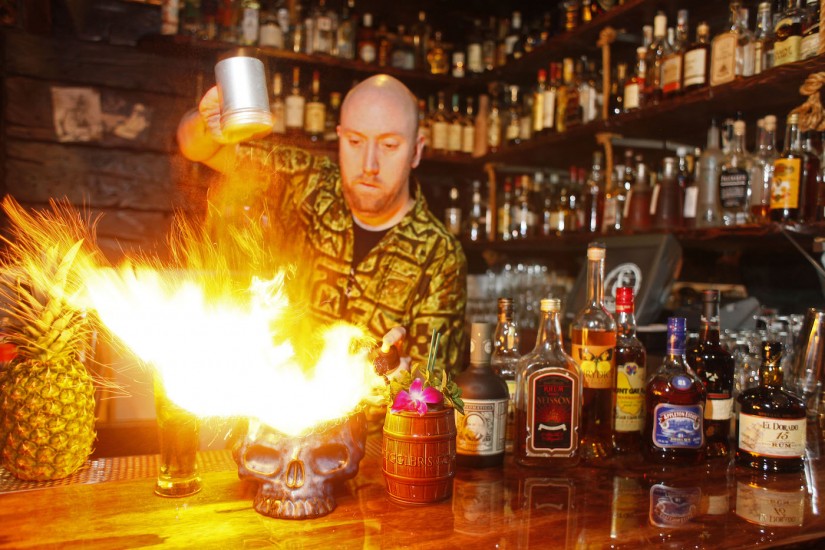America’s tiki obsession hit its golden era in the postwar years, continuing into the 1950s and ’60s. After World War II, servicemen carried home stories of faraway Pacific lands. Among those returning was the author James Michener, a former naval reservist, who won a Pulitzer Prize in 1948 for his book Tales of the South Pacific. Rewritten as a musical, South Pacific became first a Broadway hit, then a movie sensation in 1958. Hawaii became the 50th U.S. state in 1959. Two years later, Elvis Presley released Blue Hawaii, setting off a fresh wave of enthusiasm for island culture. And thanks to developments in commercial aviation, more Americans were able to visit the actual South Pacific. In particular, tourism to Hawaii thrived.
Tiki bars continued to provide a sense of escape, but during this economic-boom time, they acted as “a dramatic counterpoint to the go-go sense of progress, big money, chrome and steel and future and space age,” Cate explains. “Maybe I want to loosen my tie and forget about the rat race. Or the flip side of all that advancement—the constant threat of nuclear war that loomed over America as this existential threat throughout the 1950s.” It’s not a coincidence that Sven Kirsten, who wrote The Book of Tiki, called tiki bars “the emotional bomb shelter of the Atomic Age.”
This all sounds eerily familiar: Tensions with North Korea have put the threat of nuclear war back in the headlines. Study after study shows that Americans feel overworked and chronically stressed. Meanwhile, smartphones make tuning out work obligations and worrisome news harder; for many, “out of office” no longer equals “off duty.” Added to that, social media amplify the chatter of headlines and arguments, often churning up anxiety and discontent. The trappings have changed, but the “go-go sense” remains. “Maybe we’re not in the recession anymore,” Cate says. “But we’re back to those original feelings.”
No wonder tiki bars are booming again.
Yet tiki—a catchall term for mid-century-inspired homage to all things tropical and vaguely Polynesian—has evolved in recent years. For one thing, tiki has gone from being an appropriation of actual Polynesian culture to becoming an adaptation of that earlier appropriation. (More on that in a moment.) For another, the scrappy and kitschy are increasingly giving way to the luxe and well funded—in other words, 21st-century tiki is escapism, capitalized anew.
